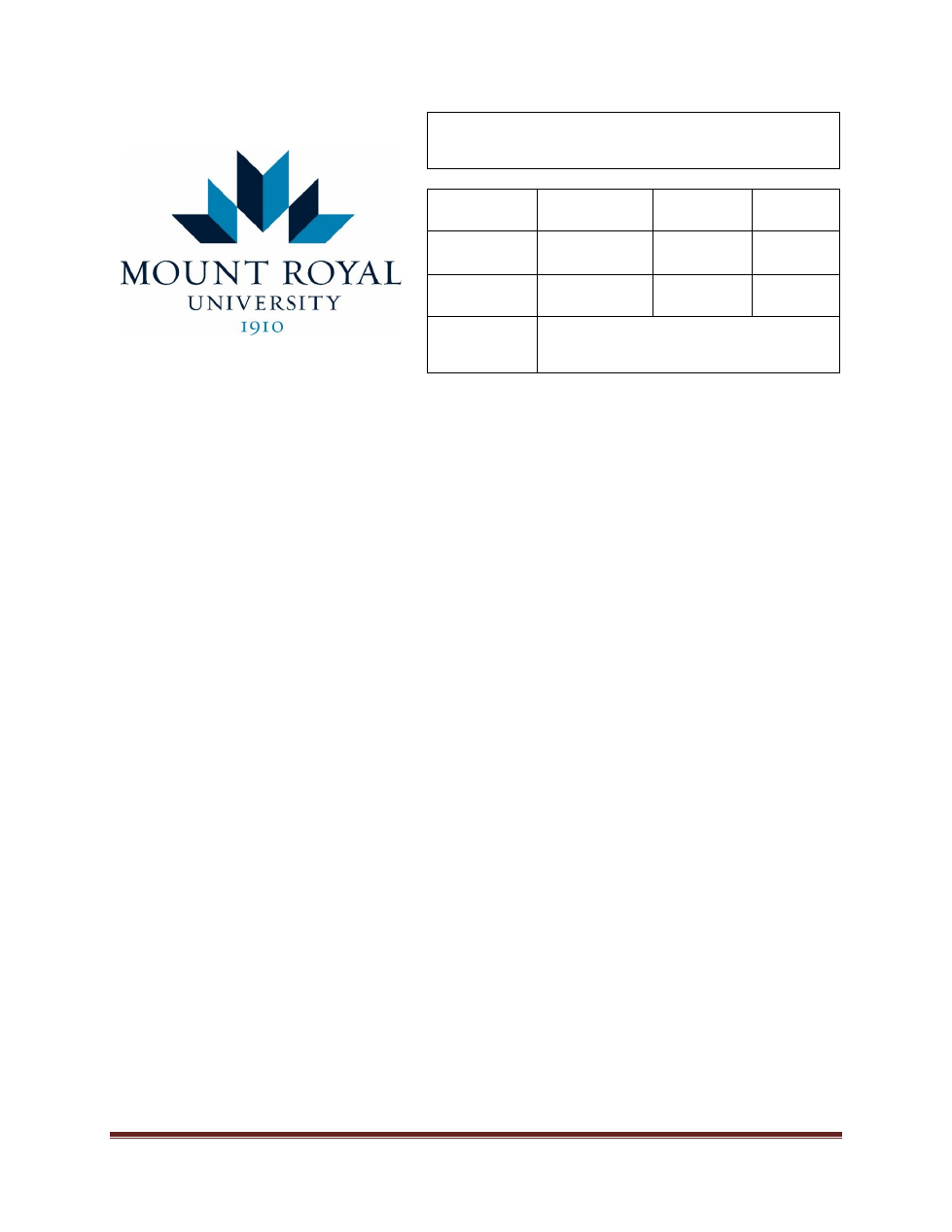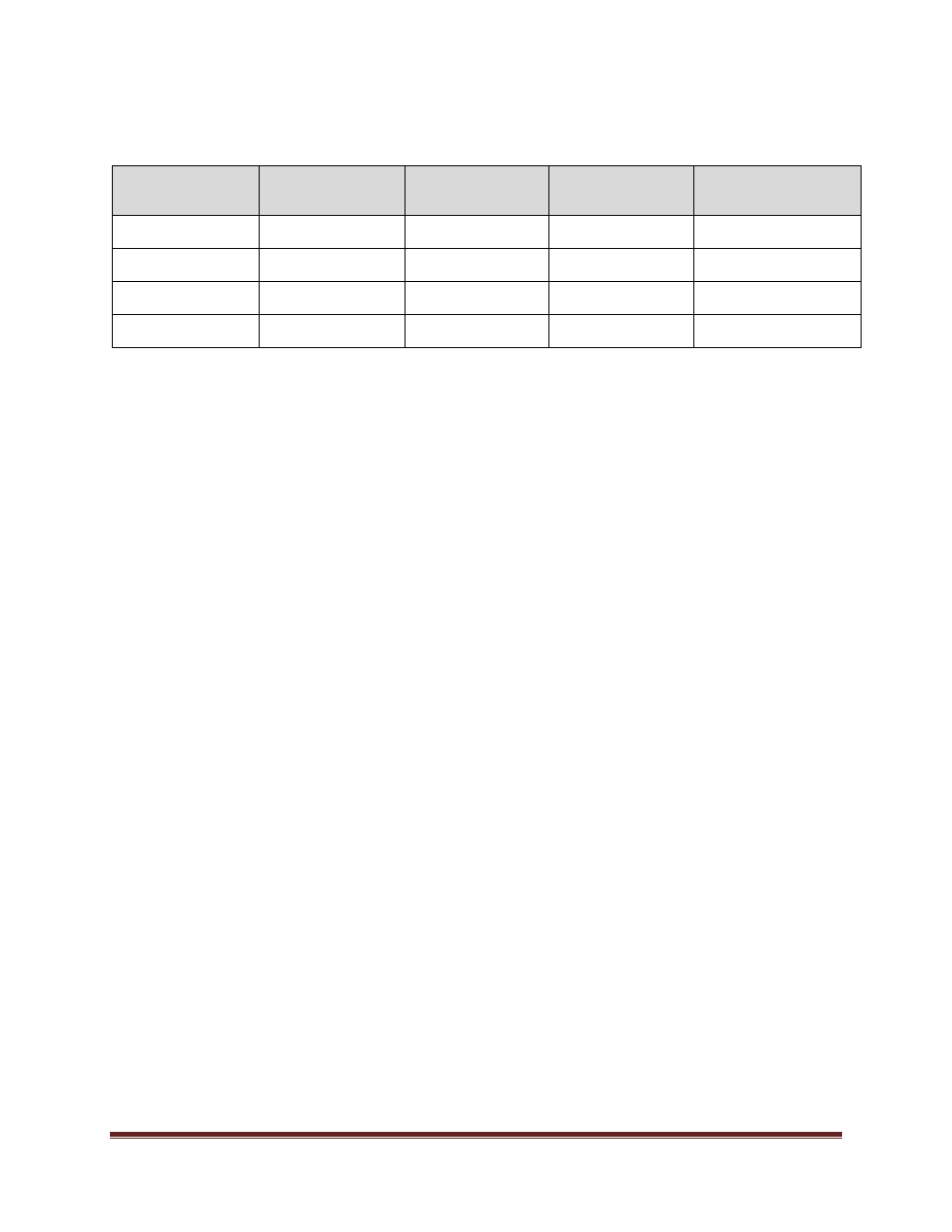
Procedure for Managing Video Surveillance
– August 27, 2019
Page 1 of 5
PROCEDURE FOR MANAGING VIDEO
SURVEILLANCE
Procedure
Type:
Management
Initially
Approved:
August 27,
2019
Procedure
Sponsor:
General Counsel
and University
Secretary
Last Revised:
Administrative
Responsibility:
Security Services
Review
Scheduled:
August 27,
2024
Approver:
Executive Leadership Committee
A.
PROCEDURES
1.
PURPOSE FOR SURVEILLANCE
1.1
The use of Video Surveillance is intended to:
a. be used for Public Security Purposes;
b. protect the University Community by discouraging unlawful or disruptive
behaviour;
c. maintain a safe and secure environment; or
d. support in the immediate response of an observed or reported incident.
1.2
The collection, use, disclosure, protection and destruction of Video Surveillance
records adheres to all applicable municipal, provincial and federal legislation, and
University policies.
1.3
These procedures do not apply to surveillance used for Law Enforcement as an
investigative tool where such activity is authorized by legal enforcement authorities,
legislation or court order.
2.
VIDEO SURVEILLANCE EQUIPMENT SET-UP AND MAINTENANCE
2.1
The Director of Security Services, or designate, approves the installation and use,
and disabling or disconnection of all Video Surveillance equipment.
2.2
Facilities Management in consultation with Information Technology Services
supervises installations of all Video Surveillance equipment.
2.3
Security Services coordinates all testing of and repairs to the Video Surveillance
system. Security Services tests the operation of all cameras and related equipment
monthly or as Security Services deems reasonable and reports any malfunctions or
concerns to Information Technology Services.

Procedure for Managing Video Surveillance
– August 27, 2019
Page 2 of 5
3.
USE AND MONITORING OF RECORDS OBTAINED THROUGH VIDEO SURVEILLANCE
3.1
The Director of Security Services is the records custodian responsible for the
supervision of Video Surveillance records, in accordance with the Records and
Information Management Program policy.
3.2
All Video Surveillance records are stored and accessed in a restricted-access area
within Information Technology Services. Access to this space is restricted to
authorized members of the
University’s Security Services and Information
Technology Services personnel. Video Surveillance equipment, or any records
therefrom, may only be removed from the restricted-access area upon the written
authorization of the Director of Security Services or their designate.
3.3
Monitoring of Video Surveillance is conducted by authorized members of Security
Services, in accordance with the Security Services Conduct policy. The Director of
Security Services, or designate, ensures that authorized individuals are provided
appropriate training. Misuse of the Video Surveillance equipment or records will
result in disciplinary action.
4.
INCIDENT REPORTING
4.1
All Video Surveillance records are retained through the completion of Security
Services incident report. Video Surveillance records are added to the report as an
attachment.
4.2
Where alleged misconduct is viewed in the regular monitoring of Video Surveillance,
the Director, Security Services, will notify the appropriate business unit of the incident
and existence of the footage.
4.3
Video Surveillance records may be used in support of an investigation and
subsequent proceedings of alleged misconduct.
a. Where a Video Surveillance record is requested as part of an investigation of
alleged misconduct, it may only be disclosed when approved by the Chief Safety,
Risk, and Employee Wellness Officer or designate.
b. If a request to use Video Surveillance records creates a real or apparent conflict
of interest for the Chief Safety, Risk, and Employee Wellness Officer, the
General Counsel and University Secretary will approve the request. In the event
the General Counsel and University Secretary has a conflict of interest, the
President will approve the request.
c. If a request to use Video Surveillance records creates a real or apparent conflict
of interest for the President, the Chair of the Board of Governors will approve the
request.
d. Upon approval by the Chief Safety, Risk, and Employee Wellness Officer or
designate, the records custodian or delegate releases the Video Surveillance
records to the requester, or advises that the requested record does not exist.
e. The approver may place any restrictions on the use, storage and viewing of the
Video Surveillance records as deemed appropriate and in accordance with
Privacy laws.

Procedure for Managing Video Surveillance
– August 27, 2019
Page 3 of 5
4.4
Video Surveillance records that have been reviewed for Law Enforcement purposes
or are included in a Security Services Incident Report, are retained for a period of
seven (7) years.
5.
RETENTION PERIOD
5.1
All Video Surveillance records are retained and disposed of in accordance with the
Records and Information Management Program policy.
5.2
If a Video Surveillance record is not viewed for Law Enforcement purposes or for the
purposes set out in these procedures, the record is retained for a period of thirty
calendar days and then deleted or otherwise securely disposed of by Security
Services.
6.
PROTECTION OF PRIVACY
6.1
All public areas of the University, as well as on or in University-owned or operated
property, are subject to Video Surveillance. Surveillance cameras and equipment will
not be positioned towards property or windows adjacent to University-owned or
operated property, nor will
Video Surveillance be placed in or on areas in which
individuals have a reasonable expectation of privacy, including but not limited to
locker rooms and washrooms.
6.2
Video Surveillance equipment may be installed in private offices where there is a
security concern pending the Director of Security Services has received written
notice of consent from the office’s occupant(s).
6.3
Video Surveillance monitors are located in a secure, restricted-access location, away
from public view.
7.
NOTICE
7.1
Signage is prominently displayed throughout the University at appropriate locations,
including all general entrances, to provide individuals with notice that:
a. there may be Video Surveillance cameras in all public areas of campus, as well
as on or in University-owned or operated property, that may be used to record
and monitor activity;
b. personal information collected through the Video Surveillance system may be
used or disclosed for Public Security Purposes;
c. individuals may contact Security Services should they require additional
information or have concerns regarding Video Surveillance; and
d. the collection of personal information is authorized in accordance with applicable
laws.
8.
ACCESS TO RECORDS
8.1
Requests for Video Surveillance records may be submitted in writing to the Chief
Safety, Risk, and Employee Wellness Officer or designate and may be routinely

Procedure for Managing Video Surveillance
– August 27, 2019
Page 4 of 5
disclosed only if the applicant demonstrates a right of access to the information in
accordance with applicable legislation.
a. If the Video Surveillance records being requested captures additional third
parties, the requestor has the right to submit a formal access-to-information
request to the FOIP Office in accordance with the Alberta Freedom of
Information and Protection of Privacy Act.
8.2
If a Video Surveillance record has been requested as part of a freedom of information
request through the FOIP Office, Security Services will release the record of the
Video Surveillance to the FOIP office.
B.
DEFINITIONS
(1)
Employees:
means individuals who are engaged to work for the University
under an employment contract, including but not limited to
faculty, staff, exempt, casual and management employees.
(2)
Law Enforcement:
means policing, including but not limited to, criminal
investigations or proceedings having the potential of leading to
penalties or sanctions
(3)
Public Security
Purpose:
means a use or disclosure relating to disciplinary, legal or public
safety and security purposes or in accordance with any court
order of subject to the University’s policies or procedures or
applicable legislation
(4)
University:
means Mount Royal University
(5)
University
Community:
includes Mount Royal University Board of Governors,
employees, students, contractors, consultants, volunteers and
persons visiting the University campus
(6)
Video Surveillance: means a television system in which signals are not publicly
distributed but are monitored and recorded, primarily for
surveillance and security purposes. The signals are transmitted
from a television camera to receivers by cables or telephone
links forming a closed circuit.
C.
RELATED POLICIES
• Acceptable Use of Computing and Communication Resources policy
• Code of Conduct – Employees
• Records and Information Management Program policy
• Security Services Code of Conduct
D.
RELATED LEGISLATION
• Alberta Freedom of Information and Protection of Privacy (FOIP) Act

Procedure for Managing Video Surveillance
– August 27, 2019
Page 5 of 5
E.
RELATED DOCUMENTS
F.
REVISION HISTORY
Date
(mm/dd/yyyy)
Description of
Change
Sections
Person who
Entered Revision
(Position Title)
Person who
Authorized Revision
(Position Title)
01/19/2022
Editorial
Related Policies
Policy Advisor
General Counsel and
University Secretary
12/20/2022
Editorial
Title Changes
Director, Security
Services
04/20/2023
Editorial
Definitions
Policy Advisor
General Counsel and
University Secretary
01/11/2024
Editorial
Position Title
Update
Manager, Security
Services
12/17/2024
Minor
Position titles and
Section 4
Manager, Security
Services
Deans
’ Council




